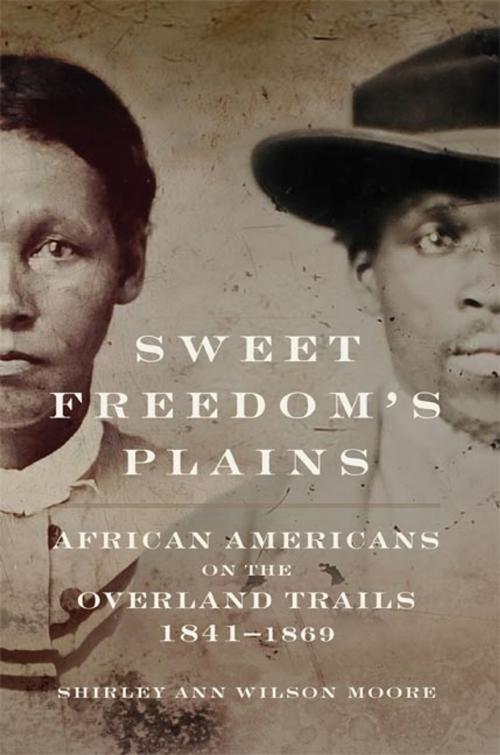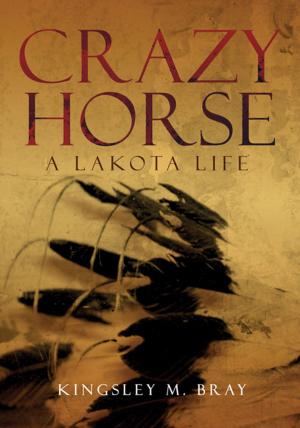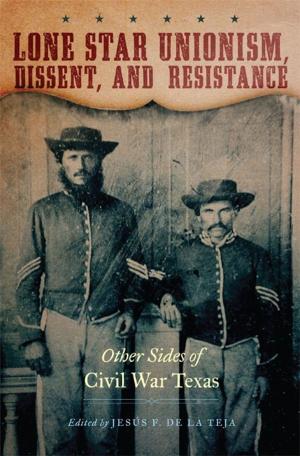Sweet Freedom's Plains
African Americans on the Overland Trails, 1841–1869
Nonfiction, Social & Cultural Studies, Social Science, Cultural Studies, African-American Studies, History, Americas, United States, 19th Century| Author: | Shirley Ann Wilson Moore | ISBN: | 9780806156859 |
| Publisher: | University of Oklahoma Press | Publication: | October 20, 2016 |
| Imprint: | University of Oklahoma Press | Language: | English |
| Author: | Shirley Ann Wilson Moore |
| ISBN: | 9780806156859 |
| Publisher: | University of Oklahoma Press |
| Publication: | October 20, 2016 |
| Imprint: | University of Oklahoma Press |
| Language: | English |
The westward migration of nearly half a million Americans in the mid-nineteenth century looms large in U.S. history. Classic images of rugged Euro-Americans traversing the plains in their prairie schooners still stir the popular imagination. But this traditional narrative, no matter how alluring, falls short of the actual—and far more complex—reality of the overland trails. Among the diverse peoples who converged on the western frontier were African American pioneers—men, women, and children. Whether enslaved or free, they too were involved in this transformative movement. Sweet Freedom’s Plains is a powerful retelling of the migration story from their perspective.
Tracing the journeys of black overlanders who traveled the Mormon, California, Oregon, and other trails, Shirley Ann Wilson Moore describes in vivid detail what they left behind, what they encountered along the way, and what they expected to find in their new, western homes. She argues that African Americans understood advancement and prosperity in ways unique to their situation as an enslaved and racially persecuted people, even as they shared many of the same hopes and dreams held by their white contemporaries. For African Americans, the journey westward marked the beginning of liberation and transformation. At the same time, black emigrants’ aspirations often came into sharp conflict with real-world conditions in the West.
Although many scholars have focused on African Americans who settled in the urban West, their early trailblazing voyages into the Oregon Country, Utah Territory, New Mexico Territory, and California deserve greater attention. Having combed censuses, maps, government documents, and white overlanders’ diaries, along with the few accounts written by black overlanders or passed down orally to their living descendants, Moore gives voice to the countless, mostly anonymous black men and women who trekked the plains and mountains.
Sweet Freedom’s Plains places African American overlanders where they belong—at the center of the western migration narrative. Their experiences and perspectives enhance our understanding of this formative period in American history.
The westward migration of nearly half a million Americans in the mid-nineteenth century looms large in U.S. history. Classic images of rugged Euro-Americans traversing the plains in their prairie schooners still stir the popular imagination. But this traditional narrative, no matter how alluring, falls short of the actual—and far more complex—reality of the overland trails. Among the diverse peoples who converged on the western frontier were African American pioneers—men, women, and children. Whether enslaved or free, they too were involved in this transformative movement. Sweet Freedom’s Plains is a powerful retelling of the migration story from their perspective.
Tracing the journeys of black overlanders who traveled the Mormon, California, Oregon, and other trails, Shirley Ann Wilson Moore describes in vivid detail what they left behind, what they encountered along the way, and what they expected to find in their new, western homes. She argues that African Americans understood advancement and prosperity in ways unique to their situation as an enslaved and racially persecuted people, even as they shared many of the same hopes and dreams held by their white contemporaries. For African Americans, the journey westward marked the beginning of liberation and transformation. At the same time, black emigrants’ aspirations often came into sharp conflict with real-world conditions in the West.
Although many scholars have focused on African Americans who settled in the urban West, their early trailblazing voyages into the Oregon Country, Utah Territory, New Mexico Territory, and California deserve greater attention. Having combed censuses, maps, government documents, and white overlanders’ diaries, along with the few accounts written by black overlanders or passed down orally to their living descendants, Moore gives voice to the countless, mostly anonymous black men and women who trekked the plains and mountains.
Sweet Freedom’s Plains places African American overlanders where they belong—at the center of the western migration narrative. Their experiences and perspectives enhance our understanding of this formative period in American history.















